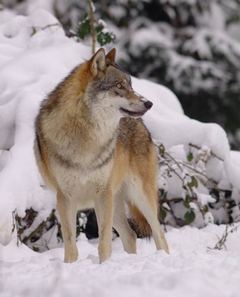Conservation of large carnivores

Protection of European large carnivores is an integral part of nature conservation. As the top predators, wolves, lynx, and bears play the key role in maintaining healthy ecosystems. They impact the populations of wild ungulates, reducing the damage to vegetation, which ultimately leads to better ecological balance and increased biodiversity. By selecting weaker and sick animals as their prey, large carnivores help limit the spread of diseases. Same effects on the quality of the environment can never be achieved by (costly) human management.
Top predators have large spatial requirements. The home territory of one animal may comprise hundreds of square kilometres. Limited space inside the protected areas cannot support viable populations of these species in Europe.
Therefore, to ensure the survival of large carnivores it is necessary that people learn to share the landscape with them and find the ways to avoid potential conflicts. This, however, seems to be the most difficult and most ambitious task, particularly as it requires the change of traditional views and old prejudices.
Legislative protection
All three species of large carnivores are strictly protected under the Czech legislation. The grey wolf and brown bear are considered critically endangered, Eurasian lynx a threatened species (Act No. 114/1992 Sb. on nature conservation and Decree No. 395/1992 Sb.). Large carnivores are also listed in Appendix IV of the Habitats Directive as the species which are to be strictly protected by all EU Member States. The requirement is implemented in the Czech context by Decree No. 166/2005 Sb., as amended in relation to the establishment of the Natura 2000 network. The bears, wolves, and lynx are included on the list of species subject to protection in some Natura 2000 sites.
To minimize the human-wildlife conflict, any damage caused by large carnivores is compensated in accordance with Act No. 115/2000 Sb.
Practical conservation of large carnivores
Despite the legal protection, the populations of large carnivores in the Czech Republic are stagnating, mainly due to poaching. To ensure the law enforcement in this area is very difficult as there is usually very little evidence and most cases of poaching remain undiscovered. The most effective approach thus seems to influence the attitudes of gun owners (hunters in particular) towards large carnivores. The focus of large carnivore conservation needs to be the shift of people’s opinions, especially of those living in the areas with presence of wolves, lynx or bears, towards greater acceptance of wild animals and lower tolerance of poaching.
Friends of the Earth Czech Republic (Hnutí DUHA) together with the civil society organization Beskydčan launched the project “Protection and return of large carnivores” in 1999. The project included presentations, round tables, exhibitions, media campaigns and also the field monitoring of large carnivores conducted by the volunteers of the so-called “Wolf Patrols”.
Friends of the Earth CZ continue working for the conservation of large carnivores with activities ranging from awareness-raising campaigns to field monitoring and the prevention of poaching (“Wolf Patrols”), and the protection of important wildlife corridors.
In 2005, in response to increasing number of illegal lynx killings in the Bohemian Forest, Friends of the Earth CZ launched the “Lynx Patrols” as a joined project with the Šumava PLA Administration.

Clockwise: Presentation for local hunters about the importance of large carnivores – Collecting data in the field – Educational programme at schools
Public involvement
The survival of large carnivores depends on the opinions and attitudes of people who share the landscape with them. To increase the tolerance of local people and avoid potential conflict it is necessary to provide people with objective information unbiased by the centuries-old prejudices.
The accurate knowledge of the current status and distribution of wolf, lynx, and bear populations and a better understanding of their ecology is crucial for their efficient protection.
In addition to organizing the Wolf and Lynx Patrols, where volunteers can take part in field monitoring, we encourage the public to report any observations and findings of occurrence signs to us at stopy@selmy.cz.
Transboundary cooperation
The populations of large carnivores in the Czech Republic depend on their links with core populations in neighbouring countries. In the Bohemian Forest, we work with Austrian and Bavarian experts and conservation authorities on the protection of the lynx.
In the Beskydy and Javorníky Mountains, our study recently confirmed that the return of wolves requires better protection of their population in Slovakia. Unfortunately, Slovak authorities issue hunting quotas for wolves and bears without sufficient information and proper assessment of the impact of hunting on large carnivore populations. We will continue to support Slovak environmental organizations in opposing the legal hunting of wolves and bears.
What can you do?
Do you believe that wolves, lynx, and bears belong to the European landscape? Would you like to help with their protection?
- take part in field monitoring and help us collect more information
- support our work with a donation
- follow us on social media and share the information with your friends

The map of migration corridors in the Czech Republic created as an output of large mammal migration project.


